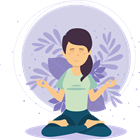How to treat OCD
by Varnika Mathur
Obsessive-compulsive disorder (OCD) is a condition where the affected individual is stuck in a chronic loop of anxiety. People are trapped in constant cycle of repeated obsessions and compulsions over which they have no control –
- OCD Obsessions – People are stuck in a loop of distressing fears and urges over which they have no control. Such thoughts cause intense anxiety.
- OCD Compulsions – To curb these obsessions and anxiety, people tend to behave a certain way or develop certain routines. They don’t actually want to act that way, neither does their behaviour give them any pleasure, but they continue to believe that without following the pattern, their condition will get worse. The cycle keeps on repeating endlessly and the loop leads to ever-returning anxiousness.
OCD cannot truly be cured but the treatment can help the affected people gain some relief and control their urges to a certain extent. The treatment could either be given in form of psychotherapy or medication, usually a combination of the two works most effectively.
Cure for OCD
As time moved on, physicians noticed different types of OCD behaviour which were more relatable to the cases for cleaning, washing, checking, aggression and sexual obsessions rather than religious cases which are now considered as types of OCD. People can have any type of obsessive thoughts or compulsive behaviours as some of them mentioned above. Most of them primarily fall into these categories :
- Contamination: Some people fear that they will get contaminated with germs and thus keep washing their hands very frequently as a compulsion to avoid germs. This is quite a typical behaviour of a person suffering through OCD
- Constantly Re-Checking: Sometimes people are unsure if they have completed the task completely and correctly; and thus keep rechecking as a compulsion. For example – if a person has locked the door before leaving the house and the thought occurs what if they have left the door unlocked. Such kind of obsessive thought results in compulsions to come and check the door multiple times before leaving.
- Aggressive and sexual thoughts: This is an obsession where the person is frightful of harming others by behaving violently or getting obscene thoughts which won’t go away
- Organization: This is one of the most recognizable and most common type of OCD. This type includes keeping things in order or symmetrically and precisely in the right place. They need things to be visually symmetrical. Some people arrange everything number wise or keeping their surrounding neat and clean with the right in their right places. For eg : keeping all the labeled cans facing outwards. While many construe it as a knack for cleanliness, when it gets to the point that not performing the compulsions results to anxiety, then it shows signs of OCD
- Harm to loved ones: For other people, the concern is not that they would injure someone, but that their loved ones will be harmed in some way. For example, someone may be obsessed with the possibility that their child would be injured in a vehicle accident. Compulsive behaviours can be anything, yet they are frequently used to avoid injury.
- Sin, religion, and morality: Some people worry obsessively about being immoral or sinning. They may use prayer compulsively or ask for forgiveness over and over again.
- Self-control: Many people who suffer from OCD have a fear of losing control and doing something wrong. Some people are afraid of saying anything inappropriate in public, while others are afraid of hurting someone, which is related to violent or sexual obsessions. Obsession may lead to any form of obsessive behaviour, but it can also lead to isolation since a person may avoid being near people.
Actually, there aren’t any specific types of OCD. These are just the main categories which people mainly consider as types and it also gets easier for people suffering through OCD to understand these categories and have immediate recognition of where they actually stand with their own experience and can get started with the treatment as soon as possible.
About Us
Mental Healthcare is our top priority. The pandemic has affected the mental health of a lot of us, and snealth aims to revive each of us with the help of its technologies. We are groups of helping individuals who want to get you to boost your mental health. We help you get comfortable with yourself, so that you can lead a content life.
Snealth provides you with care, helps you get to a state of mind where you can appreciate life and living. We aim at removing the stigma around mental health and make society more inclusive, accepting and judgement free.



